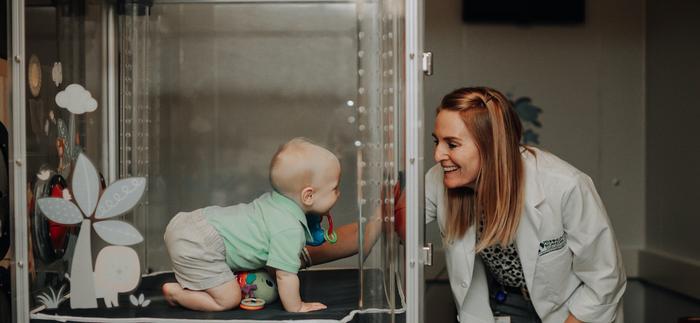Louisiana women who gave birth during the COVID-19 pandemic were 3 to 7 percent more likely to exceed the recommended weight gain levels than those who gave birth prior to the pandemic. Research from Pennington Biomedical Research Center and Woman’s Hospital in Baton Rouge showed that instances of non-optimal gestational weight gain, or GWG, were seen in more than 45 percent of pregnant women during the peak of the pandemic, whereas only 42 percent experienced non-optimal gain in the year preceding the pandemic.

Credit: PBRC
Louisiana women who gave birth during the COVID-19 pandemic were 3 to 7 percent more likely to exceed the recommended weight gain levels than those who gave birth prior to the pandemic. Research from Pennington Biomedical Research Center and Woman’s Hospital in Baton Rouge showed that instances of non-optimal gestational weight gain, or GWG, were seen in more than 45 percent of pregnant women during the peak of the pandemic, whereas only 42 percent experienced non-optimal gain in the year preceding the pandemic.
The examination of patterns in gestational weight gain during the pandemic is one of several studies conducted by Pennington Biomedical in partnership with Woman’s Hospital, the largest delivery hospital in Louisiana. The study examined more than 23,000 deliveries between March 2019 and March 2022.
“The data from Woman’s Hospital provided a unique opportunity to examine trends within an expansive population of pregnant women and how the women in our region reacted and adapted to the global pandemic,” said Dr. Leanne Redman, Associate Executive Director for Scientific Education at Pennington Biomedical and Professor of Reproductive Endocrinology & Women’s Health. “The pandemic had a wide-reaching impact, beyond the spread of the virus itself, and the resulting increase in gestational weight gain may present further indirect impacts of the virus into the future for women and babies.”
Of those pregnancies conceived after the pandemic started and the late pandemic, a slightly lower 44 percent exceeded recommendations for weight gain during pregnancy, but these participants began pregnancy at a slightly higher weight. However, for mothers living with obesity, GWG has continued to rise. These findings suggest that GWG plateaued in the later parts of the pandemic for women in our region except for those living with obesity.
Studies cited in the research affirm that the COVID-19 outbreak led to community social distancing and many people reported more time spent in sedentary lifestyles, coupled with unfavorable changes in eating habits and worsened anxiety and depression. Additionally, pregnant individuals were less likely to attend prenatal or postpartum visits with health professionals.
“Dr. Redman and her colleagues at Woman’s Hospital have shed light on an important health side-effect from the pandemic – the rise of weight gain among pregnant women in Louisiana,” said Dr. John Kirwan, Executive Director of Pennington Biomedical. “As seen with previous disasters, the stresses of the moment, the decrease in socialization and the increase in sedentary behavior associated with stay-at-home orders became a perfect atmosphere for this result. For many of us, our attention turned to other priorities and away from maintaining a healthy weight. This study shows that this was the case for many pregnant women in Louisiana during the pandemic.”
These observations mirror those seen in research following natural disasters, but whereas GWG may have been affected by a disruption of food supply, calorie availability remained abundant in the U.S. during the COVID-19 pandemic, even with increased food insecurity in certain groups.
“Woman’s is focused on improving outcomes for women and infants at every opportunity” said Rene Ragas, Chief Executive Officer of Woman’s Hospital. “This project is a perfect example of partnerships that can bridge clinical care and research to give us important insights for quality outcomes.”
Inadequate gestational weight gain has been shown to lead to harmful effects on both the mother and the newborn, but only one-third of women achieve appropriate weight gain during pregnancy. GWG can lead to an increased risk for cardiovascular disease, and even exceeding recommended weight levels by four or five pounds can increase the likelihood of lifelong obesity in the child.
About the Pennington Biomedical Research Center
The Pennington Biomedical Research Center is at the forefront of medical discovery as it relates to understanding the triggers of obesity, diabetes, cardiovascular disease, cancer and dementia. The Center architected the national “Obecity, USA” awareness and advocacy campaign to help solve the obesity epidemic by 2040. The Center conducts basic, clinical, and population research, and is affiliated with LSU.
The research enterprise at Pennington Biomedical includes over 480 employees within a network of 40 clinics and research laboratories, and 13 highly specialized core service facilities. Its scientists and physician/scientists are supported by research trainees, lab technicians, nurses, dietitians, and other support personnel. Pennington Biomedical is a state-of-the-art research facility on a 222-acre campus in Baton Rouge.
For more information, see www.pbrc.edu.
Journal
JAMA
DOI
10.1001/jamanetworkopen.2023.31277
Subject of Research
People
Article Title
Trends in Gestational Weight Gain in Louisiana, March 2019 to March 2022
Article Publication Date
29-Aug-2023




